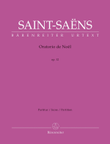Alto, Mixed choir (SATB), Piano
SKU: BA.BA11309
Composed by Camille Saint-Saens. Edited by Christina M. Stahl. This edition: urtext edition. Paperback. Score. Baerenreiter Verlag #BA11309. Published by Baerenreiter Verlag (BA.BA11309).
ISBN 9790006577705. 27 x 19 cm inches. Text Language: English.
It is a small music history sensation: Thanks to Yves Grard an unknown and unpublished manuscript penned by Camille Saint-Saëns has been unearthed in the Mdiathèque Jean Renoir in Dieppe in France.
It is the top four instrumental parts which make this manuscript something of a sensation. Placed under each other are “Saxophone Soprano en Si b”, “Saxophone Alto en Mi b”, “Saxophone Tnor en Si b” and “Saxophone Baryton en Mi b”, strings, soprano solo with chorus and organ. Musical history has hitherto credited Jean-Baptiste Singele (1812–1875) with having written the first saxophone quartet, his opus 53, which he completed in 1857. Now this historiography clearly has to be revised. The date 1854 has been found under the first page of the treasure from Dieppe, which is pasted over and also sewn, meaning that Saint-Saëns’ work was written three years earlier than that of Singele.
In contrast to Singele, Saint-Saëns does not have the wind instruments taking solo parts but rather uses their tonal colour to depict textual moods and nuances. On the one hand the saxophones accompany the choral parts (certainly singable by amateurs) and support the human voices in fugal passages. On the other hand, they take the melody in the purely orchestral passages.
Saint-Saëns wrote the motet in the period when he had taken up his first permanent appointment as organist at the Church of Saint-Merri in Paris. He revised the work several times over the decades, changing the motifs at the beginning, correcting obvious mistakes, reworking the ending, eventually changing the instrumentation several times and even – probably in the final stage – replacing the Latin text with an English one. Today, three-and-a-half versions have been handed down, one of them stopping after just a few pages. The compositional steps have been successfully reconstructed by means of detailed detective work. Furthermore, the first saxophone version (BA 11305) and the last English piano version (BA 11309) have been edited to produce a scholarly-critical edition.
The present edition of the English version for soprano solo, choir and piano (BA 11309) serves both as a full score and as a vocal score due to the instrumentation.
About Barenreiter Urtext
What can I expect from a Barenreiter Urtext edition?
MUSICOLOGICALLY SOUND
- A reliable musical text based on all available sources
- A description of the sources
- Information on the genesis and history of the work
- Valuable notes on performance practice
- Includes an introduction with critical commentary explaining source discrepancies and editorial decisions
... AND PRACTICAL
- Page-turns, fold-out pages, and cues where you need them
- A well-presented layout and a user-friendly format
- Excellent print quality
- Superior paper and binding










































